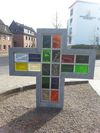

|
|
|
|
|
|
The fallen resistance people in Limburg
Laur Collas
∗ 19-07-1917 Maastricht † 06-10-1943 Maastricht (26)
- Maastricht - Unorganized resistance -
- struikelsteentjes-maastricht.nl
1. voordracht Laurent Collas
2. Locatie - Dr. F. Cammaert, Het Verborgen Front – Geschiedenis van de georganiseerde illegaliteit in de provincie Limburg tijdens de Tweede Wereldoorlog. Doctorale scriptie 1994, Groningen
3. Hulpverlening aan uit Duitsland ontvluchte (Franstalige) krijgsgevangenen, p. 212 - biogr. tracesofwar.nl
biogr. wo2slachtoffers.nl/ - Erelijst van Gevallenen 1940-1945 van de Staaten-Generaal
- Oorlogsgravenstichting.nl
- https://www.maastrichtsegevelstenen.nl/0.OORLOG/oorlog2c-verzet.htm
Glassblower, worked as a frontier worker in Aachen. On his own initiative, he regularly took escaped forced laborers and prisoners of war to Maastricht. But he did more:
Laurentius Collas had relatives in Liège whom he visited regularly. On these visits, during the German occupation, he regularly took with him Jews and other people who had to go into hiding (in his circles they were called cousins) who wanted to escape from the Netherlands. He would then take a bus to the border town of Eijsden, get off there, and smuggle the «cousins» across the border. In Belgium, Laurentius takes the «cousins» by bus to Liège. Some of these «cousins» come from Amsterdam via Clara Bouten, a friend of his sister Tini Collas. [1.1]
Source of the above is the speech (by whom, date?) at the laying of the Stumbling Stone at the place where once stood the house where he lived and died, Bonnefantenstraat 2, 6211 KL Maastricht. [1.2]
The following is a description of how a German-minded acquaintance of Tiny found out that Laurent had helped two German soldiers who were involved in acts of sabotage in Amsterdam. Cammaert gives a slightly different version, but perhaps both are correct and the SiPo had two leads:
In early 1943, he received a request from the capital asking if he could help two brothers wanted by the Sipo to escape. Collas did not know, however, that after the brothers had left, the Sipo had arrested their sister. After severe torture, she gave up the name of the Maastricht glassblower. On October 6, 1943, the SiPo tried to arrest him. Collas fled to the roof of his house on Bonnefantenstraat. There he was fired upon and was fatally shot. [2]
Almost identical are the short biographies on tracesofwar.nl, wo2slachtoffers.nl [3] and maastrichtsegevelstenen.nl/ [6]
He is buried in the Municipal Cemetery Algemene Begraafplaats Tongerseweg, Maastricht, grave EE 92. [3]
This person is listed in the “Erelijst 1940-1945” (Honor Roll of the Dutch Parliament). [4]
Footnotes

